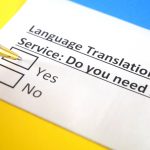Localizing SCORM and xAPI Course Content What makes e-learning translation services effective often comes down to how well a provider can adapt complex digital training materials for global audiences. Modern e-learning courses are rarely simple text-based modules. They typically include SCORM or xAPI packages, embedded interactions, quizzes, audio, video, and adaptive learning paths. For global corporations, these elements must be localized accurately so learners in every region receive the same level of clarity, engagement, and usability. High-quality localization allows organizations to maintain training consistency, meet compliance requirements, and scale professional development across markets. To achieve this standard, a professional partner... View Article

In today’s global media landscape, accessibility and linguistic precision are more important than ever. Whether it’s a feature film premiering internationally, a corporate training module being deployed across multiple regions, or a marketing video tailored for diverse audiences, professional subtitle translation services ensure that your content is understood exactly as intended. Subtitles bridge the gap between languages and cultures, preserving not just words but context, tone, and meaning. But when is it worth hiring professionals instead of relying on automated tools or in-house efforts? Below, we explore the critical scenarios where expert subtitle translation becomes indispensable, along with insights into... View Article

When it comes to global communication, accuracy in translation is only one part of the equation. The way your message is visually presented matters just as much. This is where desktop publishing services play a critical role. For businesses producing brochures, manuals, and marketing materials in multiple languages, desktop publishing (DTP) ensures that every translated document looks as polished and professional as the original. Through careful file preparation, the use of specialized software, and a deep understanding of multilingual layout challenges, DTP specialists recreate designs that preserve both linguistic precision and visual harmony. By combining translation expertise with advanced design... View Article

In an era where digital presence dictates business growth, companies cannot afford to overlook international audiences. Expanding into new regions requires more than simply translating words on a website. It demands adapting your entire digital experience so that it resonates with local customers. This is where website localization services become critical. By tailoring not just the content but also the design, user experience, and search optimization, localization helps you overcome cultural barriers, improve engagement, and significantly increase conversions. Businesses that implement comprehensive localization strategies are more likely to gain the trust of local users and establish themselves as credible international... View Article

When large corporations invest in translation for their global operations, one of the most effective technologies at their disposal is translation memory software. This specialized system is designed to store segments of previously translated text, allowing them to be reused in future projects. By capturing translations at the segment level, companies can accelerate new projects, reduce repetitive work, maintain linguistic consistency, and lower costs. For businesses that produce technical manuals, product catalogs, marketing materials, or regulatory documents, translation memory (TM) is a crucial asset in their multilingual strategy. Core Components of a Translation Memory System Translation memory systems are built... View Article





